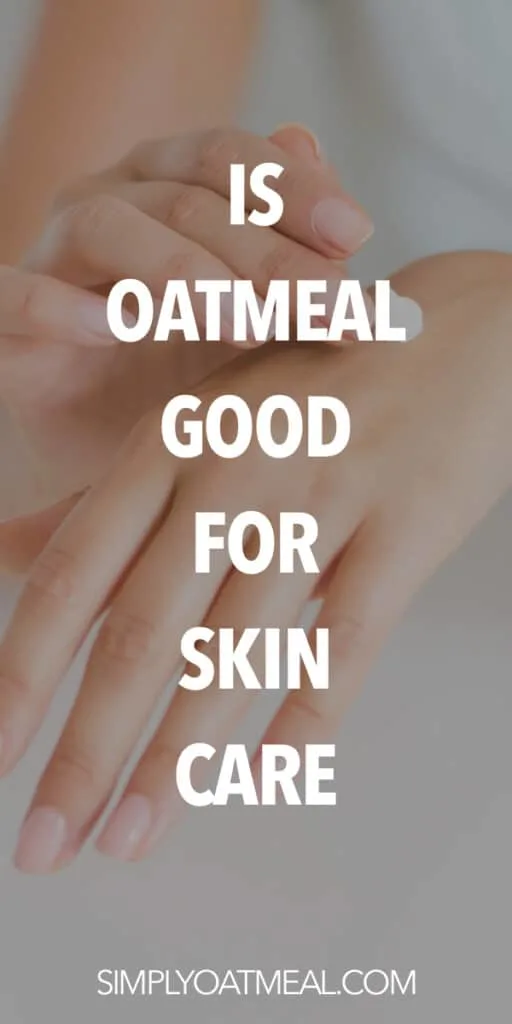You have probably heard that oatmeal is good for you health wise. Did you know, though, that oatmeal is also good for skin care?
That’s right, oatmeal applied as a topical treatment can be used to solve a variety of skin related issues like dry skin and acne, as well as improving your overall skin complexion.
Including oatmeal in your daily skin care routine is bound to result in better skin. Keep reading to learn more about the benefits of using oatmeal for skin care and more.
Oat Benefits for Skin
Applying oatmeal to your skin makes it look and feel better, which is why oatmeal is an ingredient in many skin care products available in the marketplace. However, you don’t have to buy expensive skin care products to take care of your skin though.
Oatmeal by itself, or combined with common household ingredients, imparts plenty of healing benefits on your skin.
Dry Skin
If you suffer from dry skin, oatmeal could be just what you need.
Oatmeal can be used to make a special mixture that will remove the layers of dead, dry skin cells present. Since these dead cells are clogging up your pores, their removal opens the way for new, fresh, healthier skin cells to grow.
Due to its milder pH, oatmeal also possesses considerable anti-inflammatory effects, meaning it can soothe inflamed skin.
Oatmeal is also a natural exfoliant, clearing out unhealthy toxins. Furthermore, oatmeal can act as a natural moisturizer, hydrating your dry skin and preventing future dryness.
Skin Acne
Acne is a major concern for many people, regardless of age, though it is most commonly known as being prevalent in children just entering puberty.
Though acne has many causes that cannot be fixed by topical treatments, such as a poor diet, hormone imbalance, or medication, oatmeal can be used as a treatment for acne.
In many cases, oatmeal is effective in at least reducing the severity of an acne infection. Oatmeal is good for acne, because it naturally cleanses skin.
Oatmeal also reduces the amount of oil, sebum, and dirt that would normally serve to clog up your pores.
This is because oatmeal contains something called saponins. Saponins are a foam producing chemical found in soapwort and act as a natural cleansing agent.
Oatmeal is also known to contain zinc, which can be lethal to the microbes that cause acne, and help reduce any inflammation caused by acne.
Does oatmeal lighten skin?
Oatmeal has also been found to have skin lightening properties. If you have any dark spots or splotches of skin discoloration, oatmeal can lighten them.
The amino acids contained in oatmeal are known to have a lightening effect on skin. Oatmeal also has vitamin E, which also serves to lighten skin discoloration.
Skin Whitening
You now know that oatmeal can be used to lighten your skin, but did you know that it also has a whitening effect? Components of oatmeal can lead indirectly to the whitening of skin.
For example, since zinc deficiency can lead to your skin appearing dry and dark, the zinc in oatmeal can help your skin appear whiter.
The vitamin B1 in oatmeal improves the circulation of blood throughout your body; this enhanced blood flow can also result in skin that appears whiter.
Its natural cleansing ability, removal of toxins present on the skin, and oil absorption also contribute to making your skin appear more dewy, healthy and whiter in general.
Does oatmeal remove dark spots?
Due to its lightening and whitening properties, oatmeal can be used to remove dark spots and discoloration on the skin. It can be applied directly to the dark spots to make them fade or disappear over time.
Oatmeal Skin Care Tips
There are many oatmeal skin care recipes out there. You should choose your recipe carefully.
One of the best and most common ways to use oatmeal in skin care is to form a mask. A mask is recommended because it allows time, time for your skin to absorb the full effects, and time for the oatmeal to do its work.
Masks are often mixed with ingredients such as honey, water, and plain yogurt into your oatmeal to make a soothing mask to provide the skin care benefits of oats.

Which oats are best for skin?
So exactly what kind of oats should you use in skin care? After all, there is more than one type: there are different types including steel cut oats, rolled oats, and quick oats.
So which types is the right kind for treating your skin? To be honest, it really depends on what kind of skin treatment you are going for.
The results you want, as well as your skin type ultimately determine the kind of oatmeal you should use.
Steel cut oats, being the least processed, still posses their original, non-flattened shape, are the harshest on your skin; they are a good exfoliant if you need to remove a great deal of oil, grime, and dead skin, but may be too harsh for many people.
Using a too harsh of an exfoliant can actually cause inflammation and acne flare ups on the skin. You should probably avoid using steel cut oats unless you need to remove excessive build-up.
Old-fashioned oats can be used as a much gentler exfoliant option; they grate on the skin less because they are flattened and have a softer texture.
However, the best type of oats for skin care is probably colloidal oats, finely ground oats that are commonly used in DIY skin care products.
How do you use oatmeal for skin care?
As mentioned earlier, oatmeal can be used to create a mask for your skin by adding other ingredients. However, that is not the only way oatmeal skin care products can be.
Oatmeal baths are also beneficial for your skin. Oatmeal scrubs you can quickly wash off are good if you do not have a lot of time to spare.
As part of your body, your skin needs care to remain healthy and glowing. With the numerous benefits of oats for skin care, it’s time you try adding oatmeal to your daily skin routine.
